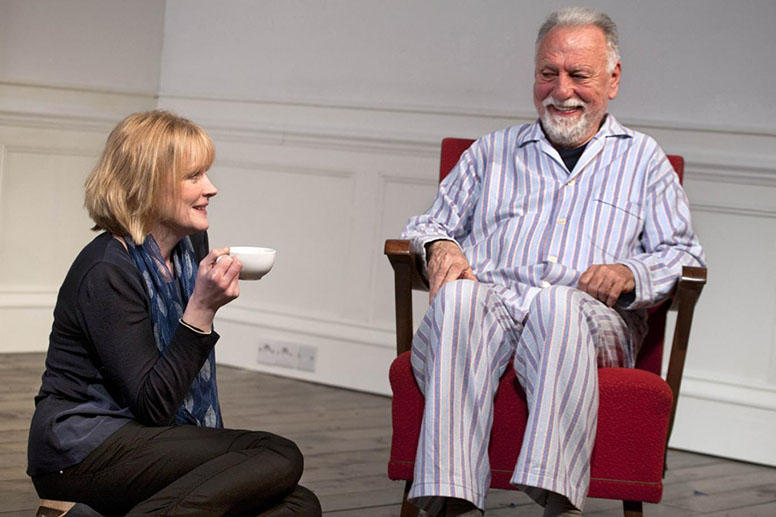There will be few people in the audience with whom Florian Zeller’s new play doesn’t resonate. Currently showing at Cambridge Arts Theatre, The Father is a starkly, at times uncomfortably honest depiction of the onset of Alzheimer’s, shown equally from the perspective of the sufferer and of those around him.
Andre is first introduced to us as a gruff but likeable figure, light-heartedly batting away his daughter Anne’s insistence that he needs more help. He seems very much in control, except that he keeps losing his watch. Then when we learn that he keeps his valuables behind the microwave and has accused his former carer of stealing, familiar alarm bells ring, and our sympathies shift to his daughter (Claire Skinner), strained and tired, unable to persuade him to see from her point of view.
The play moves disjointedly from scene to scene, broken by a hectic, unsettling score which jumps and rasps like the broken record that is Andre’s grasp on reality. Both are effective tools in evoking Andre’s increasing disorientation and panic.
Interestingly, more than just the effect of Andre’s confusion, we are invited to experience for ourselves his muddled interpretation of events, in the portrayal of similar scenes with varying elements and a wobbly linear narrative.
Once, Anne is in his flat telling him she is moving to London with her new lover. But next, he finds himself confronting a stranger (an actor we haven’t seen before either), sitting calmly in his chair, who has been happily married to Anne for 10 years. And incidentally, this isn’t his flat at all, but theirs. And London has never been on the cards.
When a completely different actress walks in as Anne, we experience his surprise, see his sadness (Kenneth Cranham also portrays, masterfully, a sense of wounded pride and embarrassment) on realising he can’t recognise his own daughter, and Anne’s devastation too.
More than just a depressing vision of ageing, The Father is also surprisingly funny at times, the mood of the play rising and falling as Andre’s moods undulate. He turns on the charm for new carer Laura, telling her he used to be a tap dancer, then abruptly berates her for patronising him, the atmosphere turning on a knife edge.
We see equally the comedy of the situation from his perspective (“Now I have heard everything,” he mutters, when given the next seemingly nonsensical piece of information) and the pathos of an old man talking nonsense himself. “Everyone’s helping themselves!” he exclaims, diva like, of his watch and valuables. Of course they’re not, and the notion of strangers queuing up to grab handfuls of his worldly possessions is amusingly ridiculous. So Florian captures the bittersweet experience of dealing with a relative with the disease.
For his daughter Anne, managing her father is frustrating, heartbreaking and all-consuming. “I think about the kind of man he was,” she says, “He had so much authority but now he wants me to sing him a lullaby.”
The final scenes are uncomfortable to watch, as Andre rages against and is consumed by the disease. Sad, raw and unexpectedly very funny in parts, The Father combines the highest quality acting with honest, astute writing and clever staging. A modern-day King Lear, catch it now before it sells out the West End.
The Father, Cambridge Arts Theatre, until 26 September

